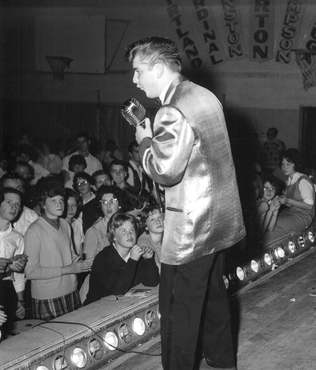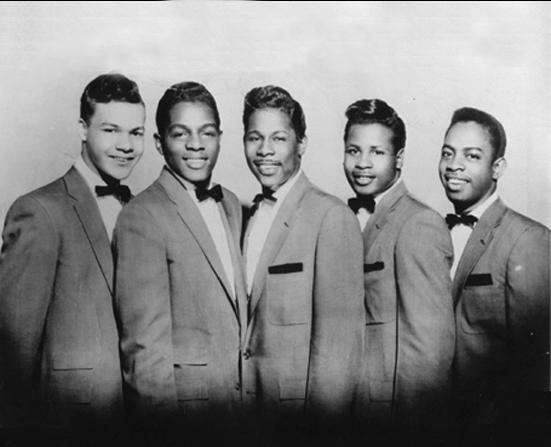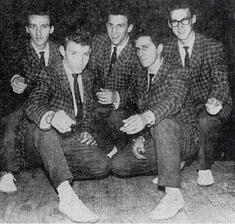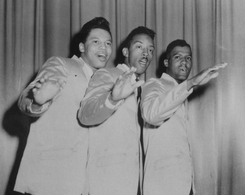-

1954 - The Five Turbans (L to R) H.Hudson, H.Lewis, B.Bernard, C.Dorsey and T.Goodrich
The Five Turbans (Indianapolis, IN.)
aka The Monograms (1)Personnel :
Hilton Hudson (Baritone/Tenor)
Bobby Bernard (Baritone/Tenor)
Clarence Dorsey (Baritone/Tenor)
Tony Goodrich (Baritone/Bass)
Herman Lewis (Bass)
Discography :
The Five Turbans
1954 - Christmas Prayer / Yuletide Story (Deb 802)The Monograms (1)
1957 - Please Baby Please / My Baby Dearest Darling (Saga 100)Biography :
Indianapolis R&B outfit the Monograms formed in 1953 -- vocalists Bobby Bernard, Clarence Dorsey, Tony Goodrich, Hilton Hudson, and Herman Lewis formed the group while attending Arsenal Technical High School, originally dubbing themselves the Five Turbans (and wearing said headgear during their performances at local nightspots). The 5 Turbans played most of the clubs around Indianapolis, including George's Bar and Orchid Room, the Missile Club, the Cotton Club, the Pink Poodle, the Barrington Lounge, the Trianon Ballroom, and the B&B Supper Club.

1954 - The Five Turbans on WFBM-TV.
Their repertoire consisted mostly of the big hits of the day and their own interpretations of standards. In October, Leo Lesser (owner of George's Bar and Orchid Room) announced his new label, Deb Records. The 5 Turbans recorded "Christmas Prayer" and "Yuletide Story" in November 1954. After rejecting a contract offer from Sun Records on the advice of their attorney, the quintet members renamed themselves the Monograms in 1954.

According to Marv Goldberg's profile in the April 2005 issue of Blues & Rhythm, fledgling jazz great Wes Montgomery occasionally sat in on guitar, and as their local fame grew they auditioned unsuccessfully for Chess Records. The Monograms signing to the local Saga imprint to release "Please Baby Please" b/w "My Baby Dearest Darling" in 1957.
1957 - The Monograms (L to R) H.Lewis, T.Goodrich, C.Dorsey, H.Hudson and B.Bernard
Indianapolis radio played "Please Baby Please" regularly but it did not earn notice outside the area, eventually prompting the group to dissolve in early 1959. Later that year Bernard revived the Monograms name, assembling a new lineup featuring lead tenor Charles Anderson, first tenor Robert "Chico" Penick, and second tenor Johnny Hardiman. Although it never recorded, this incarnation of the group continued until 1964, when Anderson resigned due to health issues and was replaced by George Black.

1964 - The Monograms
When Bernard exited the following year, the Monograms' days appeared officially numbered, but despite regular personnel changes the group continued performing until the mid-'70s.
http://www.uncamarvy.com/Monograms/monograms.html
Songs :The Monograms (1)
My Baby Dearest Darling Please Baby Please...
 your comment
your comment
-

The Corvets (1) (Bronx, New-York)Personnel :
Joe Lento (Lead)
Vince "Zeke" Zeccola (First Tenor)
George De Alfonso (Second Tenor)
Richie Howell (Baritone)
Vance "Bo Bo" Halup (Bass)
Discography :
The Corvets (1)
1958 - Lenora / My Darling (Way out 101)
1960 - Only Last Night (In A Garden) / Shark In The Park (20th Fox 223)
1960 - So Long / Alligator In The Elevator (Laurel 1012)Joey Dell & The Corvets (1)
1961 - Let's Find Out Tonight / Only Last Night (On The Garden) (Roulette 4422)Biography :
This group was organized in the mid-1950s in the bronx, New York. Prior to cutting their first record for Way Out, they called themselves Freddie & the Steadies. When they were scheduled to record, they changed their name to the Corvets.

Hallup, Zeccola, Howell, ShuhThe Way Out Label was one that Zeccola founded, producer for, and distributed. His reason for doing this was that no other company wanted the Corvets on their label. They next cut a demo and took it to Broadway' Brill Building, where they tried again to impress a recording company.

Executives at Laurie apparently liked what they heard and had them record the Laurel Disc. Following the recording, Jules Hahn replaced Richie Howell. If you've ever wondered about similarities in the sound of the Bob Knight Four's "Good Goodbye" disc and the Corvets' disc "So Long", there's good reason.


Their unscrupulous manager had lifted Hallup's voice track from the Corvets recording and put it on the Bob Knight Four Record.

Needless to say, a new manager was found. Despite their persistence and a new label (20 th Century Fox), Success was not in the cards for the Corvets.
http://www.facebook.com/pages/The-Corvets/142690645769276Songs :
The Corvets (1)
Lenora My Darling
Only Last Night So Long
Alligator In The Elevator Shark In The Park
Joey Dell & The Corvets (1)
Only Last Night (On The Garden)...
 your comment
your comment
-
 Standing from left, Skip Hadden, Tommy Esian & John Magyar. Seated from left, Jimmy Harris, Ricky Vac & Paul Ticherich.
Standing from left, Skip Hadden, Tommy Esian & John Magyar. Seated from left, Jimmy Harris, Ricky Vac & Paul Ticherich.
Ricky Vac & The Rock-A-Ways (Berea, Ohio)
aka The Rockaways (3)Personnel :
Ricky Vaculig (Ricky Vac) (Lead)
Paul Ticherich
Jimmy Harris
John Magar
Jimmy Gillahan
Tommy Esian
Discography :
Ricky Vac & The Rock-A-Ways
1961 - Collen / How Do You Think I Feel (Hilltop 1871)Colleen Kaye & The Rockaways (3)
1961 - Two Girls / Tell Me Why (Hilltop 1878)
Biography :Ricky Vaculig, a 16-year-old Berea High student, decided to start a band after hearing Bill Haley’s "Rock Around the Clock" at the drive-in. Gathering a few fellow classmates and others in 1956, Ricky shortened his name and created the band, Ricky Vac and the Rock-A-Ways, a vocal and instrumental group . Members included Paul Ticherich, Jimmy Harris, John Magar, Jimmy Gillahan, Tommy Esian and later, Skip Hadden. They were also a racially integrated band - one of their guitarists, Jimmy Harris, was black.
 Tom Esian, Jimmy Harris, Paul Gillahan, Ricky Vac, Paul Techerich and John Magyar
Tom Esian, Jimmy Harris, Paul Gillahan, Ricky Vac, Paul Techerich and John MagyarWhen Ricky was just sixteen he went to Cleveland and recorded a song he wrote titled "My Baby's Gone". Jack Scott picked it up and released it on one of his albums and it became a national hit. The Rock-A-Ways wrote and played their own original music. Jimmy Harris (the bands guitarist) composed three instrumentals, The Band signed a recording contract the first of which, "Rock-A-Way Boogie" became the bands theme song. The second tune was "Dream Theme", and the third was "Doo Flicky Junction".


Ricky teamed up with Paul Ticherich (the piano player) to write a song about a native gal from Berea. Ricky named the song "Colleen" after classmate Colleen Kaye Siodla, who sometimes sang with the band. The tune was recorded on Hilltop Records, a subsidiary of DOT Records. Ricky Vac and the Rock-A- Ways performed that tune on the Danny Thomas "National Heart Fund" television show. The same year, they backed Colleen Kaye Siodla on Hilltop Records.

The band played at the old Sahara Motel in Cleveland. It was the anchor band for the KYW radio station’s road show. They also played at Paramount Theater on the same bill as The Flamingos and a new singer, Frankie Avalon. The band gained fame along the way. The band music stopped in the early 1960s when Ricky was drafted. He wanted to return to it in 1964, but discovered the British had invaded the nation.
Songs :
Ricky Vac & The Rock-A-Ways
Collen How Do You Think I Feel
Colleen Kaye & The Rockaways (3)
Two Girls Tell Me Why
… your comment
your comment
-

The Moroccos (Chicago)
aka The Four Chimes aka the Moroccans
Personnel :
Norman Bradford (Lead)
Melvin Morrow (Tenor)
Lawrence Johnson (Tenor)
Prayer "George" Kemp (Baritone)
Fred Martin (Bass)
Discography :
The Four Chimes
1954 - My Easy Bab (United) (Unreleased)
1954 - When Was My Baby Born (United) (Unreleased)
1954 - Before i met you (United) (Unreleased)
The Moroccos
1955 - Morocco chant (United) (Unreleased)
1955 - Pardon my tears / Chicken (United 188)
1955 - Somewhere over the rainbow / Red hot & chili mac (United 193/B&F 193)
1956 - My love (United) (Unreleased)
1956 - What is a teen-ager's prayer? / Bang goes my heart! (United 204/B&F 1347)
1957 - Sad sad hours / The Hex (United 207)
Lillian Brooks & The Moroccos
1956 - For only you / She Boodle dee, Boodle dee (King 4934)
1956 - Sweet sweet william / No parking (King 4956)
The Moroccans
1957 - Believe in tomorrow / You fascinate me (The Philipairs) (Salem 1014)
Sammy Fitzhugh & The Moroccans
1958 - Sadie Mae / Linda Baby (Poplar 115)
Biography :
The Moroccos came out of the Englewood community, on the south side of Chicago, the same region that produced both the El Dorados and Dukays. They scored a national hit and regional smash with their rendition of Harold Arlen's "Over the Rainbow." The core group -- Norman Bradford (lead), Prayer "George" Kemp (baritone), Fred Martin (bass), Melvin Morrow (tenor), and Lawrence Johnson (tenor) -- formed around 1952. Kemp, whose birth surname was actually Prayer (but who used his father's name George as his stage name), generally acted as the group's spokesperson and leader and met with Leo Allen about a recording contract with United Records. Shortly before this, however, Johnson dropped out, and Bradford -- who reportedly had to make himself scarce in the Chicago area for some unknown reason -- joined the Army. At the last minute, Kemp recruited Ralph Vernon as his replacement. (Years later Johnson would become a member of an obscure '70s group, the Majestic Arrows.)
The first session, in the fall of 1954, did not prove satisfactory. The group -- who were by then calling themselves the Four Chimes -- recorded "Easy Baby" and "When Was My Baby Born," the latter of which was a reworking of an old Negro religious folk song called "The Last Month of the Year." United decided to shelve the recordings and Allen and the group agreed that what they needed was -- not only a fifth member -- but also an additional lead.

The group recruited Sollie McElroy, formerly of the Flamingos (from nearby Douglas, a suburb of Chicago). McElroy had been the Flamingo's lead singer since 1952, but he was having problems in the group and wanted out. He was already in his twenties, while the remaining Four Chimes were still in their teens. Nevertheless, he fit in much better, and with McElroy as a member, the group went into session again in January 1955. One of the musicians in the studio had a set of maracas, which inspired the group to adopt the name, becoming the Moroccos. The first session yielded a dance tune, "Chicken," which became the Moroccos' first 45 release, which actually received some airplay, but failed to chart.
The next session, in May 1955, produced a McElroy-led version of the Harold Arlen tune "(Somewhere) Over the Rainbow." Released in October, this record was a double-sided hit in the Chicago area, but "Over the Rainbow" would land the group their first national attention. The Moroccos might have been able to exploit the single's popularity with live appearances; however -- after auditioning as "The Harlem Blackbirds" -- they had already signed a contract for an eight-week promotional tour of Australia with Larry Steele's Smart Affairs road show (the preeminent black entertainment organization presenting a variety of black acts in one package tour). Each member of the group made 150 dollars per week as a per diem on the Australian tour.

The Moroccos returned to Chicago in mid-February 1956 and high schooler Vernon (who was underage and unable to travel with them) rejoined the group for a Midwest tour, sharing bills along the way with the Coasters, the Flamingos, the Danderliers, and the Dells. They also backed Lilian Brooks on a session for King Records.
In late July, the Moroccos had one more lined up session with United, but shortly before the group was to go into the studio, Prayer Kemp joined the Marines. His replacement was Calvin Baron. The session ended up producing two releases for the Moroccos, including "What Is a Teenager's Prayer," later a hit for Joe Simon.

Unfortunately, United was incapable of promoting and pushing the Moroccos as the company was about to fold. The Moroccos did one more session, this one for Salem Records, but it too failed to attract an audience, and the group decided to split.
Vernon and Martin followed Kemp's lead and joined the Marines, while Morrow later joined the Army. Only McElroy and Baron immediately continued intermittently in the music business. In 1961, McElroy joined the Chaunteurs. Near the end of the 1950s, Calvin Baron joined the Cosmic Rays, a vocal group created and recorded by the avant-garde jazz artist Sun Ra.
In the late 1960s, Kemp and Morrow joined with the former El Dorados lead Pirkle Lee Moses to form the Major-Minors and put out an obscure record on the Scat label in Detroit. In 1970, when they recorded some tunes for Al Smith's Torrid label, Smith insisted on having their name changed to the recognizable El Dorados name. Shortly afterward the group broke up. Moses and Kemp were part of yet another El Dorados revival group during the '80s.Bryan Thomas, All Music Guide
http://hubcap.clemson.edu/~campber/unitedstates2.html
Songs :
Somewhere over the rainbow Pardon my tears
What is a teen-ager's prayer? Bang goes my heart!
Chicken Red hot & chili mac
CD : your comment
your comment
Doo Wop - Rhythm & Blues - Mail : jcpiazza26@gmail.com








